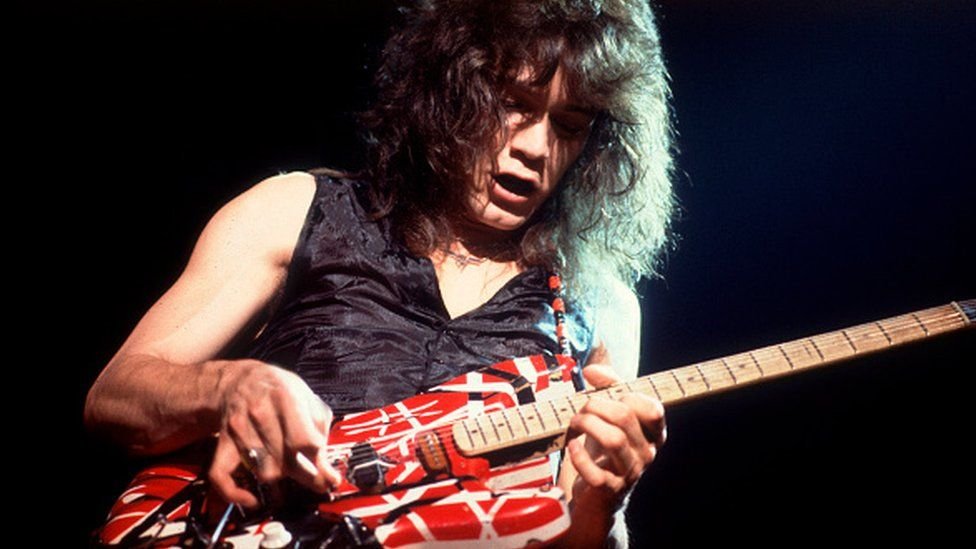Eddie Van Halen, the illustrious maestro, and co-originator of the renowned rock ensemble Van Halen, stands exalted for his avant-garde methods and electrifying stage presence, which dramatically transmogrified the realm of guitar virtuosity. Yet, a curious juncture unfolded in the late 1970s when Eddie Van Halen found himself ensnared in an exceptional predicament.
He asserted that two guitarists were adorning themselves with his distinct style, a proclamation laden with audacity, given his pioneering contributions to the musical domain. In the ensuing exposition, we embark upon the riveting narrative surrounding these two guitarists – Rick Derringer and Tom Scholz – and their purported appropriation of Eddie Van Halen’s signature sonorous tapestry.
Two Guitarists Eddie Van Halen Said Were Copying Him
Rick Derringer
Rick Derringer, an adept American guitar savant and vocal luminary, had already etched his identity in the musical milieu well before Van Halen’s zenith. Derringer’s odyssey in the musical panorama commenced in 1965, culminating in the release of his maiden solo opus in 1973. Distinguished for chart-toppers like “Rock and Roll, Hoochie Koo” and “Real American,” he had also orchestrated harmonious collaborations with the Winter siblings, Johnny and Edgar.
In 1979, Eddie Van Halen expressed his disenchantment during an interview with Jas Obrecht for Guitar Player magazine. He recollected an episode where Derringer acted as the vanguard for Van Halen and unfurled a guitar solo bearing an uncanny resemblance to Eddie’s proprietary stylistic imprints. Consumed by vexation, Eddie directly confronted Derringer, articulating, “I was reared on your musical oeuvre. How can you engage in this emulation? Regardless of your mastery, abstain from mimicking my melodious essence.” Despite this tête-à-tête, Derringer persisted in echoing Eddie’s solo, thereby precipitating his exclusion from the concert’s inaugural act.
Eddie acknowledged Derringer’s prodigious prowess but was disheartened that Derringer had elected to mirror his style, especially when Derringer had an oeuvre replete with its distinctive offerings, notably Johnny Winter’s “Still Alive and Well.” This episode underscores the fine demarcation between veneration and mimicry in the tapestry of music.
Tom Scholz
Tom Scholz, the harbinger, six-string magician, and orchestrator of the rock collective Boston, stands celebrated for his meritorious contributions to the orchestral symphonies of rock. Boston’s eponymous debut composition in 1976 ascended to momentous acclamation, adorned with hits like “More Than a Feeling,” “Peace Of Mind,” and “Foreplay/Long Time.” This musical endeavor propelled Boston to burgeon into one of the preeminent rock groups of all epochs, with more than 75 million phonographic memoirs disseminated globally.
Eddie Van Halen’s encounter with Tom Scholz materialized during Van Halen’s overture for Boston in the late 1970s. While executing their recital, Eddie unveiled his distinctive guitar solo, only to witness Scholz fashion an emulation of the same solo, rendering the spectators bemused. Eddie vented his vexation, commenting, “Tom Scholtz is truly intransigent. He embodies unsociability. One might conjecture that he envisions himself as an omnipotent entity.”
In stark juxtaposition to Derringer, Scholz refrained from socializing with Van Halen’s ensemble preceding and succeeding the concert. This absence of interaction compounded Eddie’s chagrin. He adamantly deemed Scholz’s actions disrespectful and conveyed his sentiments to the guitar virtuoso within Boston, thereby igniting a heated altercation.
The accounts of both Rick Derringer and Tom Scholz cast a luminous spotlight on the fiercely competitive and, at times, contentious nature of the musical domain. While imitation may be construed as a form of homage, it can simultaneously ignite friction and rivalry, especially among artists who regard their craft with profound solemnity.
Epilogue
Eddie Van Halen’s epoch-defining guitar idioms and performances have bequeathed upon him the status of a musical luminary within the annals of the 20th century. His imprints on the sphere of rock and roll are beyond superlatives, rendering it unsurprising that fellow guitar aficionados might be compelled to emulate his distinct artistry. Rick Derringer and Tom Scholz, two virtuosos in their own right, discovered themselves ensnared within the crosshairs of Eddie’s disapproval.
The narratives of their respective encounters with Eddie Van Halen, as recounted by the maestro himself, unfurl the intricate duality between emulation and inventiveness in the dominion of music. Though Rick Derringer and Tom Scholz may have momentarily “borrowed” fragments of Eddie’s artistry, they have concurrently forged successful trajectories of their own, imprinting indelible markers upon the realm of rock music.
Ultimately, the musical cosmos evolves unceasingly, a dynamic landscape wherein artists draw nourishment from their precursors, and sometimes this nourishment kindles sparks of creative discord. Eddie Van Halen’s legacy remains unblemished, his influence upon guitar aficionados and the tapestry of rock music unceasing, cementing his position as an indomitable icon of the rock and roll pantheon.
